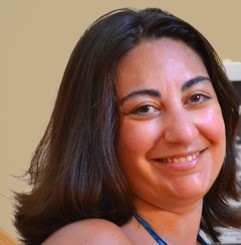Shirin Zarqa-Lederman sees past barriers—whether they’re ideas about what international psychology is, perceived differences between people, or thoughts about historical divides.
“I love learning about different people and the way they live all over the world,” Zarqa-Lederman says. “For me, growing up as a child of  immigrants, it was just that more poignant. We would go overseas to visit family and I was amazed that we had similar problems—our approaches to them were just different.”
immigrants, it was just that more poignant. We would go overseas to visit family and I was amazed that we had similar problems—our approaches to them were just different.”
Her range in perspective isn’t just from her own firsthand experiences—it is from how she was raised, the daughter of Palestinian refugees.
“My father was exiled from Palestine in 1948—his family ended up in Jordan. My mother’s family went to Syria,” Zarqa-Lederman explains. “My mother ended up migrating to Jordan with my father. And then the two of them ended up immigrating to the United States in the 1970s.”
Despite their experiences, Zarqa-Lederman’s parents always emphasized that polarization wasn’t the norm— and isn’t the answer.
“My parents grew up pre-1948 in Palestine,” Zarqa-Lederman says. “Growing up, my parents were very focused on making sure that we knew that the culture was not as polarized as it seemed. So they would teach us things: we would sit for Sukkot [a Jewish holiday], because that was something that my dad did pre-1948 with his friends. During the Feast of Ramadan, everybody came over. It wasn’t about being a Muslim or Jewish or Christian.”
This perspective, born from both her upbringing and studies, has now informed the way she raises her family and lives her life. Stemming from this love of knowing and understanding people, Zarqa-Lederman solidified her path to psychology practice by getting her master’s at The Chicago School of Professional Psychology. She is currently studying for her Ph.D. in International Psychology.
“I love how The Chicago School incorporates diversity into its curriculum,” Zarqa-Lederman says. “When I was getting my master’s in Child and Adolescent Psychology, I took a family genealogy class. We had to submit a genealogy report, and my professor took the time to count my first cousins—and I have 49! Those are the little things that meant the most, that ability to celebrate who I am.”
The appreciation for diversity and inclusion shapes the work that Zarqa-Lederman does in psychology and beyond. Her children’s book, “The Trotters of Tweeville,” focuses on this very idea—a unique use of her psychological background to help children be more kind.
“At the core of every major religion is a message about being kind. Kindness is a universal language,” Zarqa-Lederman says. “As a psychologist, I was hearing a lot about how people were having a really hard time teaching their kids social skills and how to utilize kindness. For me, the book was the answer to that.”
The inclusive thread in her life shapes the work that Zarqa-Lederman does—whether it’s her work as a psychologist, student, mother, author, or advocate.
“I’m big on gratitude and giving to others. I do believe that good things happen in service to others. So I really try to use that to guide everything that I do,” she says.
Learn more about The Chicago School
To learn more about academic programs at The Chicago School of Professional Psychology, fill out the information below to request more information. You can also apply today through our application portal here.

